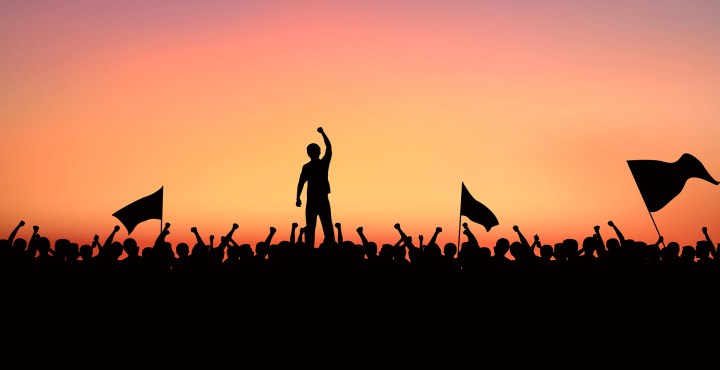RIGHTS REPRESSION OP-ED
Year in review – Protesters take to the streets across Africa in 2022 despite restrictions

From Eswatini to Chad, people have taken to the streets across Africa to demand political and social change.
Over the past year, protests have been recorded in more than 30 countries across the continent, finds a new global report by the Civicus Monitor. Despite the right to peaceful assembly being protected by many national constitutions and international law, such as the 75-year-old Universal Declaration on Human Rights, protesters face a range of unlawful risks and restrictions.
In numerous countries, restrictive laws or emergency regulations have been deployed to make it difficult for people to protest, including the need for permits and levying fees. Authorities have also used outright bans to prevent protests from taking place, often using grounds such as disturbing the public order, security concerns or public health reasons.
In Guinea, the military transitional authorities, who took power after a military coup, banned all public protests that were “likely to compromise social tranquillity” until the start of the electoral campaign period, which could be years away.
In South Africa, the City of Johannesburg tried to impose exorbitant fees for organising protests, up to R15,000 for a union strike, arguing that protests require additional municipal services. Luckily the Johannesburg High Court found the proposed fees unconstitutional.
One of the most prevalent protest violations is the detention of protesters, being recorded in more than 20 African countries from the past year. Arrests at protests can be frequent, such as in Zimbabwe where people are arrested for picketing, rallying and holding demonstrations. In March, 10 students belonging to the National Students Union were arrested for protesting peacefully against fee hikes at the University of Zimbabwe. Further arrests against the price hikes were made in April.
In the same month in Angola, 22 protesters were arrested during a peaceful demonstration in the capital, Luanda, to demand the release of political prisoners and to call for free and fair elections. They were later prosecuted for rioting and disobeying a police order to disperse.
To quell and prevent protests, authorities sometimes detain the organisers before the planned gatherings.
In July, two opposition politicians in Sierra Leone were arrested on accusations of inciting unlawful street protests, a day before the “Black Monday” protests against the high cost of living, economic hardship and economic policies took place in Freetown.
In South Sudan in August, activists were arrested ahead of planned nationwide anti-government protests, organised by the People’s Coalition for Civil Action. On the eve of the planned protests, authorities in that country also shut down the internet, which is becoming an increasingly common tactic in Africa and beyond.
Excessive force and retaliation
On numerous occasions, security forces, in an attempt to disperse protesters, used excessive force, sometimes leading to casualties.
Protesters have been killed in at least eight African countries over the past year. In Chad, Guinea and Sudan, protesters were killed in mass protests against the military juntas to demand a return to civilian rule. In eastern DRC, protests, often against increasing insecurity, have turned deadly. In January, Mumbere Ushindi Dorake, an activist of the social movement LUCHA, was fatally injured, after security forces used live ammunition while breaking up a peaceful protest in Beni, North Kivu province.
Read in Daily Maverick: “Civil society has been a force for change – but can it change the politics of South Africa?”
Following peaceful protests, protesters and organisers often face retaliatory actions, such as judicial harassment, criminal prosecution and the banning of civil society groups.
Visit Daily Maverick’s home page for more news, analysis and investigations
In Cameroon and eastern DRC, where martial law has been imposed since May 202, protesters are tried in military courts instead of civilian courts. In Cameroon, where protesters are often prosecuted under the 2014 anti-terror law, dozens of people continue to languish in prison for their participation in peaceful protests from years past, for instance protests in the Anglophone regions in 2017 and anti-government opposition protests in September 2020.
In Zimbabwe, protesters are often prosecuted for charges of incitement to public violence. Renowned novelist Tsitsi Dangarembga and her co-accused, Julie Barnes, were sentenced in September 2022 to a suspended prison sentence of six months and a fine for having participated in a peaceful anti-government protest, holding a placard that read: “We want better. Reform our institutions.”
Following mass protests against the military transitional authorities, protest coalitions in Chad and Guinea, Wakit Tama and Front National pour la Défense de la Constitution (FNDC) were dissolved and banned in October and August 2022 respectively.
Another tactic used by authorities to intimidate protest organisers is the summons to and questioning of the protest conveners, which happened to Zainab Naseer Ahmad in Kano and Ibrahim Birniwa in Kaduna, following protests against increasing insecurity in northern Nigeria. Activists who took part in the pro-democracy protests that erupted in Eswatini have also faced retaliatory attacks, including arson, abductions, torture and the raiding of their homes.
In too many countries, the story on protest rights looks bleak. At a time when civic rights are needed more than ever to hold governments accountable, the space to protest is being heavily restricted. We need governments to respect the right to peaceful assembly, investigate abuses by security forces and work closely with civil society to halt this downward spiral and push back against the authoritarian forces at work. DM/MC
Ine van Severen is the Civic Space Researcher at Civicus Monitor.


















 Become an Insider
Become an Insider
Comments - Please login in order to comment.